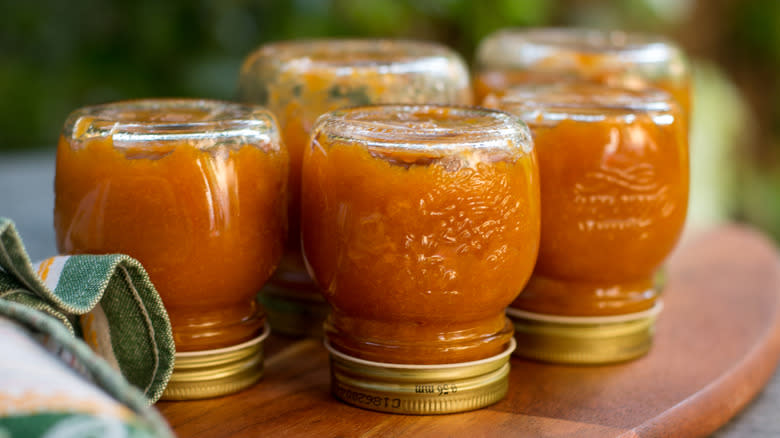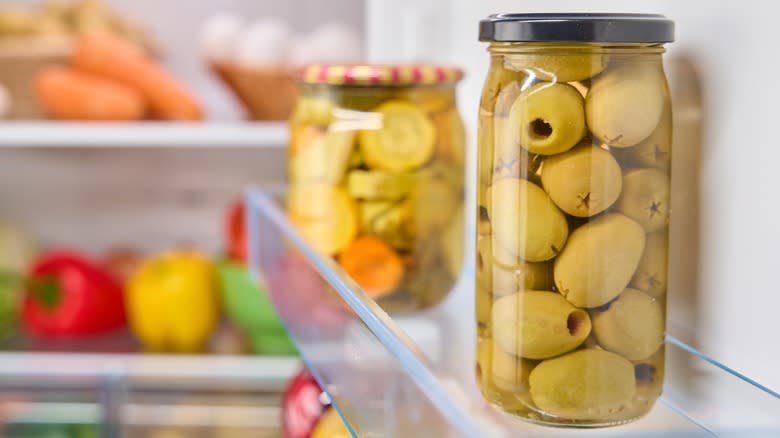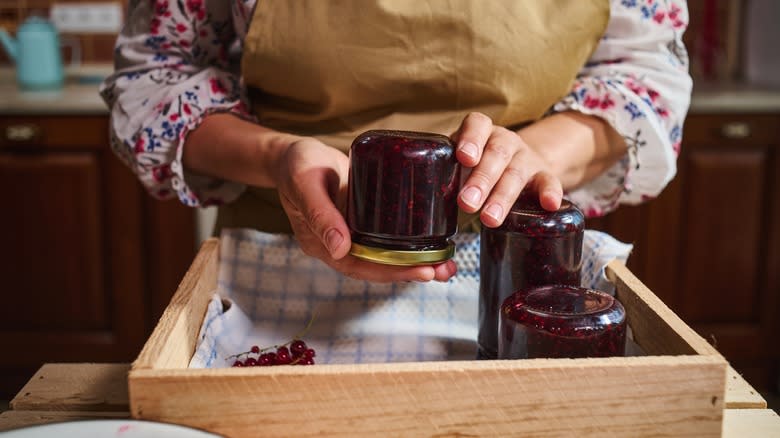The Important Info To Know About Storing Jars Upside Down

The only thing better than catching up with the latest viral hacks is when those hacks actually work. Learning that someone discovered that a bread clip is great for kitchen cleaning or that it's easy to turn a Mason jar into a salt pourer is pretty neat, but it's also important to debunk the so-called hacks that might seem like a great idea, but have more to them than meets the eye.
That's especially true when you start talking about the kind of hacks that involve food safety. One particular story made the rounds back in 2020, and it was so easy that there's a good chance many people heard about it, started doing it, and continued. It's the idea that storing jars upside down will keep food fresher for longer, and who doesn't want that to be true?
The idea is that when jars are upside down, mold won't grow, and food won't spoil. It sounds like a tip that might just be legit, but it turns out that the science says there's a bit more to it. Should you do this? Probably not, because the science is iffy at best, and food safety is something you never want to mess around with.
Read more: The Best Way To Clean That Nasty Grease Off Of Your Kitchen Cabinets
No, Storing Jars Upside Down Won't Prevent Bacteria And Other Microorganisms From Growing

The tip about storing your jars upside down to prevent food waste first showed up on a now-defunct Facebook page, and perhaps unsurprisingly, it spread like wildfire. Some people who tried it immediately reported having problems with leaking jars, and when the Daily Mail spoke with Cathy Moir, senior food microbiology consultant with CSIRO Agriculture and Food, it learned that there were bigger problems than a few leaks.
Moir explained that by flipping the jars, the surface of the food exposed to the environment when it's opened is pressed against the lid. And, although she said molds and other contaminants "will find it more difficult to grow," it didn't make the method safe. For starters, it only really applied to thick foods — like salsa. For jars filled with liquid, it wouldn't work at all.
Even for thick foods, the "hack" came with a caveat. Moir said that storing jars upside down would stop mold from visibly spoiling your tomato paste, but it won't prevent yeasts and some bacteria from growing. "Yeasts can grow with or without air," she said. Bottom line? "When we open [jars], we are exposing the contents to the environment and all of the microbes that are on or around us." Storing jars upside down won't get rid of them, and foods can still harbor growing colonies of microorganisms you don't want to eat.
This Isn't The Only Time The Upside Down Jar Trick Has Surfaced

The idea that flipping jars upside down will somehow keep food fresher and safer for longer also shows up in a process called inversion canning. That's a method of preserving that involves boiling foods, jarring them, then letting them sit upside down. Although it was long believed that the hot food would both sterilize and seal the jar, we know today that there are a few ways for things to go horribly wrong.
In addition to the fact that this method doesn't sterilize jars and contents, there's also the possibility that as it sits upside down, it'll interfere with the jar's vacuum seal. And it's nothing to mess around with: Improperly processed canned foods can contain botulism, a pathogen that can't be seen, causes foods to show no signs of spoilage, and, per the CDC, can be deadly.
Since we now know you're better off storing glass jars the regular way, how long can you safely leave them in the fridge? That depends on what's inside, and it can vary greatly. Pasta sauces, for example, should be used within five to seven days, and storebought salsa will be fine for a few weeks. Fresh homemade salsa, however, definitely won't have the same shelf life and will only be good for a couple of days. Food safety experts stress that you should always check for signs of spoilage, and remember, it's better to be safe than sorry.
Read the original article on The Daily Meal.


